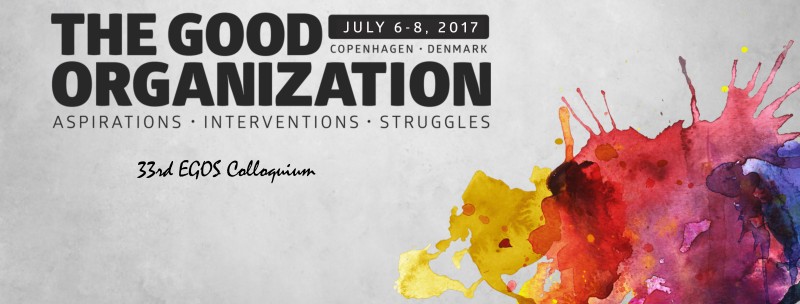Sub-theme 16: Risk, Value and Virtue in the Audit Society
Call for Papers
Risk and value are co-implicated in the construction of reality. Thirty-five years ago Douglas and Wildavsky, in Risk
and Culture (1982), analysed the value-based and selected nature of risks. Ten years later the English edition of Beck’s
(1992) Risk Society named the anxieties of a post-Chernobyl generation and proposed that we live in an era of ‘reflexive
modernity’ preoccupied with organizing the future through the identification and management of ‘man-made’ risks. And twenty
years ago The Audit Society (Power, 1997) analysed the rise of auditing and monitoring as a mode of risk management
and control and as a powerful order of worth defined by compliance with laws, regulations and other performance requirements.
The 2017 anniversaries of these three texts provide the broad intellectual coordinates for this sub-theme in
which we hope to explore the entanglement of risk, value and virtue within risk management and auditing practices. We live
in developed societies in which elaborate apparatuses of control, verification and performance reporting have been created
in many sectors to manage a complex ‘ecology’ of related risks (Maguire & Hardy, 2015). The laws, regulations and performance
requirements driving auditing are themselves attempts to manage a wide range of risks to health, the environment, human rights,
systemic integrity of financial systems and so forth, all of which characterize our Risk Society (Beck, 1992). Yet,
this reliance on auditing has spawned its own risks. For example, in public organizations characterized in terms of professional
ethos, mission, and the virtues of bureaucracy, the audit and performance explosion has been disruptive and disorienting.
It is said that intrinsic motivation and a sense of mission have been ‘crowded out’ by reductive, extrinsic performance requirements.
In addition, it is doubtful whether the ‘audit explosion’ of rules and performance standards has resulted in a more effective
management of first order risks to health, the environment, or financial well-being.
Is it no longer possible
to be ‘good’ in organizations, since goodness has become narrowly defined as conformity to auditable performance indicators?
And is the very nature of value conditioned and limited by our modes of accounting for it?
In this sub-theme
we invite papers which critically explore the contemporary ability of organizations to mediate and promote different values
or ‘orders of worth’, to recover notions of virtue and the good (Friedland, forthcoming), and to reflect and act on ‘values
at risk’ (Boholm & Corvellec, 2016) in this ‘auditized’ risk society.
The following four themes are indicative
directions for papers, but are not intended to be exhaustive or exclusive:
- Organizations, risk society and audit. How is the ‘organized irresponsibility’ (Beck) of the ‘risk society’ manifested in the pathologies of an audit explosion and expansion of regulation? How are contemporary organizations compelled to manage risk according to regulations and governance structures which produce illusions of control? Are oversight and monitoring a substitute for action? What risks are organizations not managing when they are preoccupied with reputation and compliance?
- Organizational routines in the audit society. What are the mechanisms, infrastructures and routines through which the audit society reproduces itself at the organizational level? How are practices of risk management both resistant to, and colonized by, requirements for the production of evidence for audit purposes? In what sense is auditability a ‘logic’ or cultural value which varies across organizational fields and national contexts?
- Values and virtues at risk in the audit society. What values does the audit society promote and what values are placed at risk? What are the effects on organizational actors of the increasing transparency and exteriorization of performance in indicators? How is it possible to do the ‘right thing’ and be loyal in organizational environments which require traces, registers and audit trails? Are ‘good’ organizational motives distorted by demands for evidence?
- (Re-)constructing the moral audit. What are the emerging or suppressed forms of counter-practice in the audit society? Do social media forms, such as Trip Adviser, radically democratize audit processes and thereby pose new kinds of risk for organizations? Can they be a medium of ‘moral audit’ through which the disapproval of the public can be made directly visible, as in the case of protests against the ‘legal’ tax arrangements of large prominent companies and individuals? Or do initiatives aimed at promoting ethics and corporate responsibility inevitably comes to be formalized and governed by the very logic of auditability which they seek to escape?
Sub-theme format:
Depending on numbers, we will adapt the format of the sub-theme to ensure a robust but sympathetic intellectual environment,
and to maximize the potential for the development of submitted papers. This may involve some departures from the usual format
in which papers are presented plenary-style to all participants.
References
- Beck, U. (1992): Risk Society: Towards a New Modernity. Thousand Oaks, CA: SAGE Publications.
- Boholm, A., & Corvellec, H. (2016): “The Role of Valuation Practices for Risk Identification.” In: M. Power (ed.): Riskwork: Essays on the Organizational Life of Risk Management. Oxford: Oxford University Press.
- Douglas, M., & Wildavsky, A. (1982): Risk and Culture. Los Angeles, CA: University of California.
- Friedland, R. (forthcoming): “The value of institutional logics.” In: G. Kruecken, C. Mazza, R. Meyer & P. Walgenbach (eds.): Topics and Issues from European Research. Cheltenam: Edward Elgar.
- Maguire, S., & Hardy, C. (2015): “Ecologies of risk: synergies, antagonisms and the organizing of risk.” Invited keynote presentation at the Workshop on “Field-Configuring Events: Time, Space and Relations”, Freie Universität Berlin, April 2015.
- Power, M. (1997): The Audit Society: Rituals of Verification.
Oxford: Oxford University Press.


